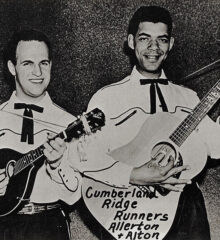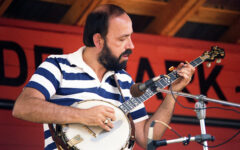
Al Hawkes passed away in the early hours of December 28, 2018, while in hospice care, just over three weeks after his wife, Barbara, had passed. The Maine bluegrass pioneer had been in failing health and was unresponsive for the past seven days. He was 88 years of age.
In recent years Hawkes couldn’t play mandolin or guitar any longer because of the debilitating effects of Parkinson’s disease. He had been diagnosed with the disease, a disorder of the nervous system that affects movement, in 2000.
Born Allerton Hawkes on Christmas Day 1930, in Providence, Rhode Island, he had lived in Westbrook, Maine, since the age of 10.
Hawkes became a fan of bluegrass music as a child. His father helped him to get hooked on southern hillbilly music by installing a radio with a long antenna that could pick up the signal from stations like WWVA, Wheeling, West Virginia; WCKY, an AM radio station in Cincinnati, Ohio; WJJD, Chicago, Illinois; and WBT, Charlotte, North Carolina.
When he was 13, his mother, a self-taught pianist, bought him a guitar and chord book, and a little while later his father gave him a Gibson A-4 mandolin. Hawkes learned to play both instruments and soon began performing the songs that he heard on the radio.
After mastering the mandolin, Hawkes went on to play the tenor and plectrum banjos, 12-string guitar, and the upright bass.
He formed his first band – Al Hawkes’ Hillbillies – as a high school sophomore. They played at local school functions and Grange Halls.
During the 1940s Hawkes performed as one half of the duo Allerton & Alton, the first interracial duo to play bluegrass music. They performed live and on radio shows until 1951, despite the heavily segregated climate of that era.
In the latter part of the 1940s Hawkes set up his own “outlaw station” to broadcast his songs, but it was very soon shut down when the Federal Communications Commission learned of his illegal operation. Whereupon he turned to broadcasting five days a week from WLAM radio in Lewiston, Maine.
He was drafted into the military in the early 1950s and served in the Maine National Guard, and based in Tripoli, in northern Africa where he was a DJ on an Armed Forces Radio station where he learned how to use up-to-date recording equipment. He appeared live on the AFRS radio station with Don Fields’ western band, and then formed his own hillbilly group called Al Hawkes and the Cumberland Mountain Folks, doing five live radio shows a week.
After his discharge he attended the Massachusetts Radio and Broadcast School in Boston for two years, at the end of which he obtained his First-Class broadcast license – allowing him to work at a directional AM station, or one with a transmitter of over 10,000 watts. Hawkes graduated with honors.
While in Boston he would often meet up with fellow bluegrass musicians, some of whom were serving in the military at Pease Air Force Base in neighbouring New Hampshire.
Shortly thereafter, Hawkes was not only playing his own music, but he built a recording studio in Westbrook, and in 1956 he established an independent country/rockabilly/bluegrass music recording company, Event Records, with his wife, and his partner Richard Greeley, an audio-visual expert.
Event Records operated until 1962 when the warehouse of its Boston distributor was destroyed by a fire, and thousands of records were lost, putting the company out of business. During that brief period, they released singles by Charlie Bailey & His Happy Valley Boys; and the Lilly Brothers, with Don Stover.
In another venture, after Event Records, Hawkes and his wife established a TV repair business at the same site as his recording studio. The illuminated sign, which still stands alongside the plaza, is an iconic site in Westbrook and is now eligible for the National Register of Historic Places.
Hawkes closed the TV/Sound Cellar in 1989, the business having run for 35 years.
All the while he continued to perform and record and produce recordings for others.
Also, Hawkes collected historic country and bluegrass records, amassing over 50,000 items.
He helped to form the Bluegrass Music Association of Maine (BMAM), founded in March 1995.
In 2010 Andrew Jawitz made a 47-minute documentary, The Eventful Life of Al Hawkes, which was broadcast on the Maine Public Broadcasting Network as well as shown locally.
This clip is a brief look at Hawkes’ life, courtesy Rockhouse Mountain Productions.
After Hawkes’s 80th birthday, then-Senator Olympia Snowe delivered a tribute to him in the Congressional Record, calling him “a Maine and national treasure.”
Over the years Hawkes was the recipient of many accolades. Joe Kennedy, co-founder of the BMAM with Hawkes, said of the man with the broad smile and big red hat, “He put Maine on the bluegrass map.”
He has been recognised by the International Bluegrass Music Museum in Kentucky as one of the ‘Pioneers of Bluegrass.’
Al Hawkes has received over 30 local, regional and National awards, among them are:
- 1980 – induction into Maine Country Music Hall of Fame
- 1983 – Bluegrass Artist of the Year MCMA
- 1984 – Folk Artist of the Year MCMA
- 1990 – North New Vineyard Mountain Bluegrass Festival- 1st place mandolin
- 1990 – National Instrumentalist of the Year – Country Music Associations of America
- 1991 – The Lenny Breau Memorial Award
- 1995 – Dick Curless Memorial Award
- 1996 – 16th Annual Country Music Pioneer Award, Down East Country Music Association (DECMA)
- 2001 – Bluegrass Music Association of Maine’s Pioneer Award
- 2001- CMAA Instrumentalist of the Year
- 2005 – Recording of the Year, Keep On Smiling – Maine Country Music Association
- 2007 – America’s Old-Time Country Music Hall of Fame
- 2008 – Lifetime Achievement Award (DECMA)
- 2008 – Music Industry Heritage Award (Boston Bluegrass Union)
R.I.P. Al Hawkes.








